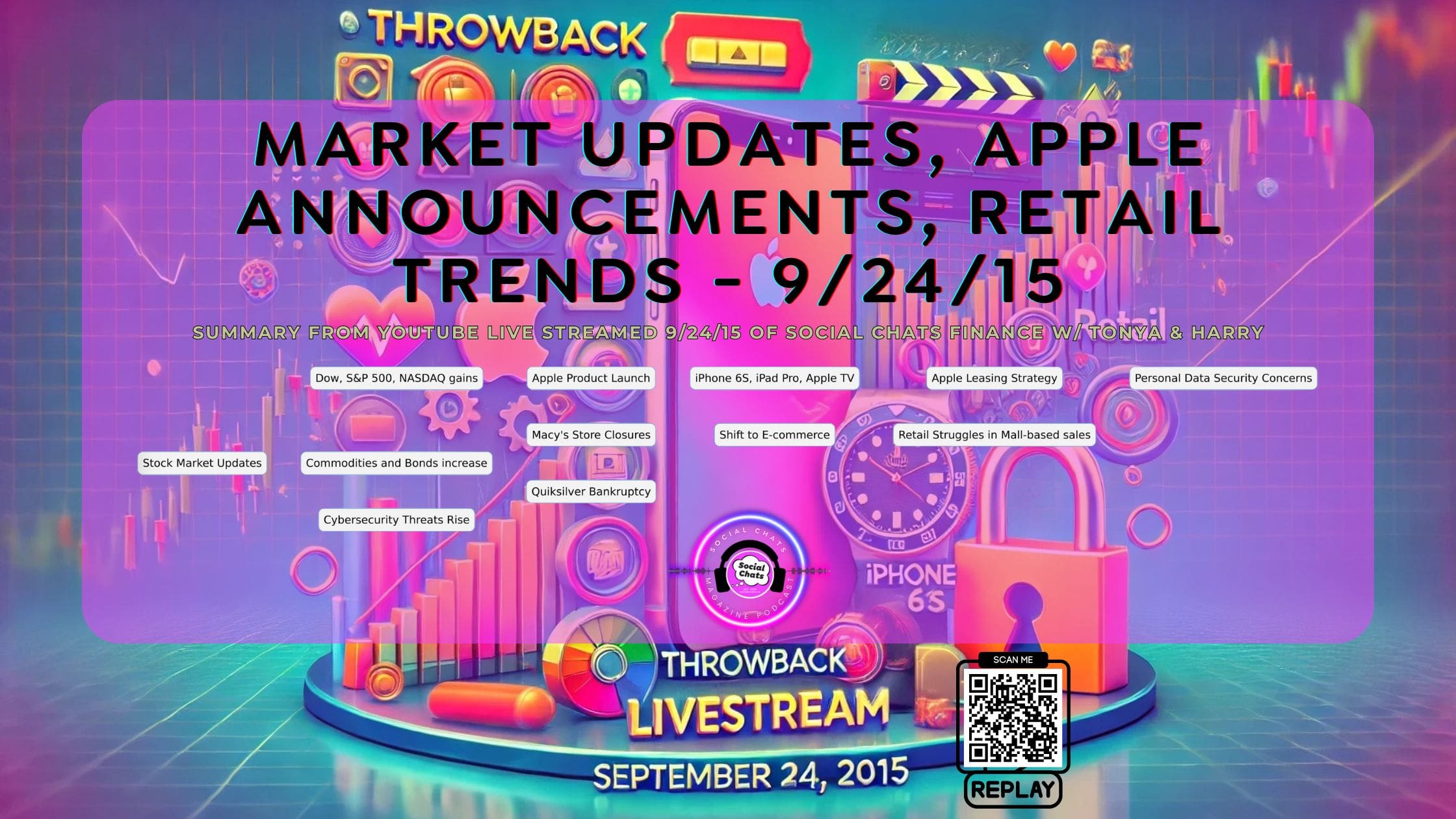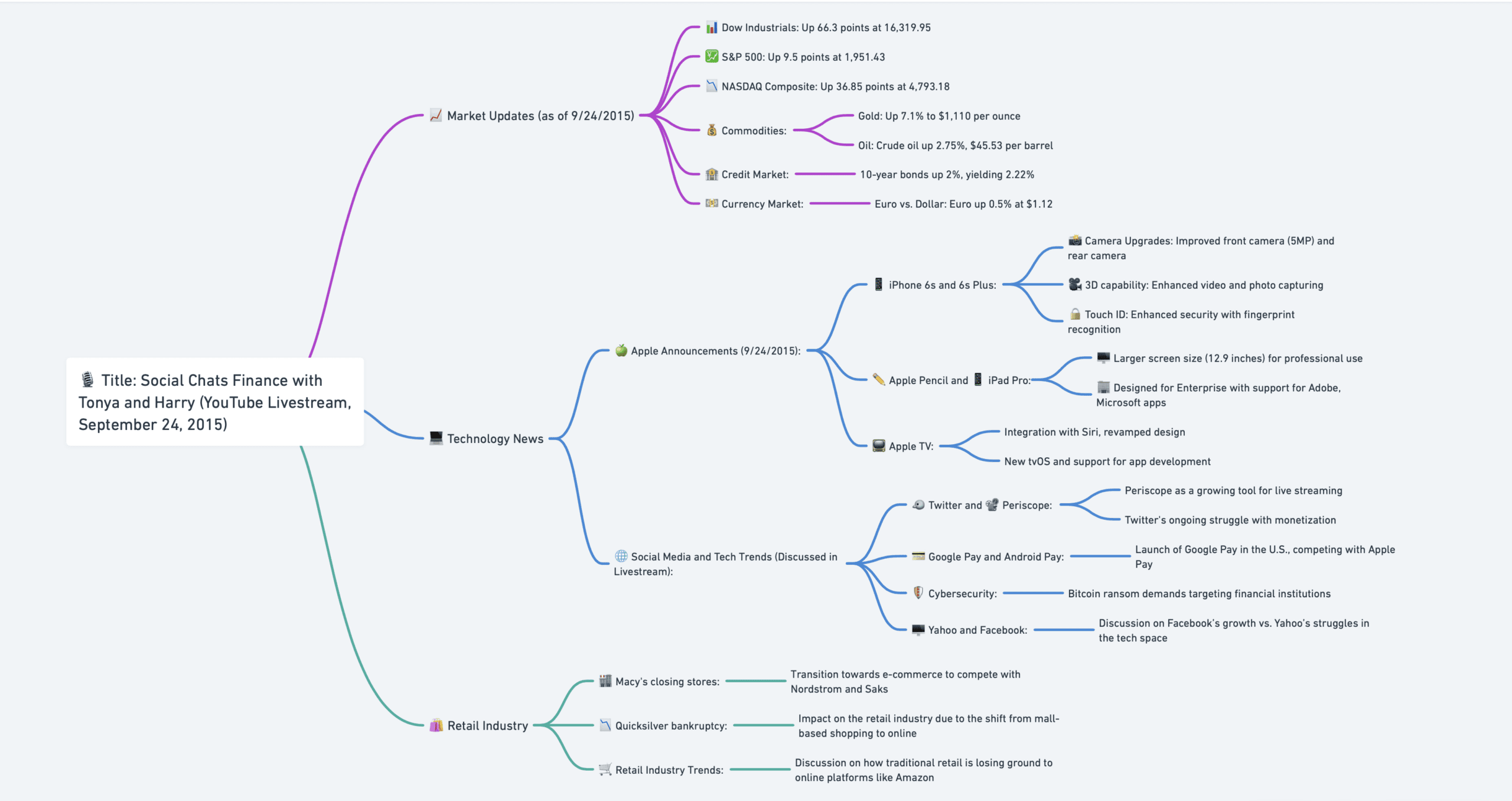

On September 24, 2015, Social Chats hosted its Finance Edition live stream, bringing viewers the latest market updates 2015, Apple announcements, and key insights into retail trends. The live stream, which airs every Thursday at 1 pm EST, featured Tonya and Harry discussing critical topics such as Apple’s product launches, changes in the retail landscape, and cybersecurity challenges.
In this session, Harry delivered a detailed stock market analysis 2015, while Tonya provided commentary on the tech giant Apple’s new products, including the highly anticipated iPhone 6s and iPad Pro. Alongside, they explored retail industry changes 2015, such as Macy’s shift toward e-commerce, and the increasing role of cybersecurity in financial services due to Bitcoin-based extortion.
🎯 Summary:
- 🎙 Tonya’s Radio Experience: Tonya reflects on her experience in LA, participating in Dr. Naina’s radio show, and learning to step back from being in charge.
- 📊 Market Update: Harry shares key insights about the Dow Jones, S&P 500, NASDAQ, gold, and crude oil markets. The market shows resilience with upward trends in all major indices.
- 📱 Apple Announcements: Exciting new products such as the iPhone 6s, iPhone 6s Plus, and iPad Pro were launched. Other key announcements include the revamped Apple TV and the introduction of the Apple Pencil ✏️.
- 🏬 Retail Shifts: Macy’s announces store closures as it shifts its focus towards online shopping and e-commerce, following trends set by competitors.
- 💼 Quicksilver Bankruptcy: Quicksilver’s Chapter 11 bankruptcy highlights the struggles faced by mall-based retail as consumers move toward online shopping platforms.
- 🔐 Cybersecurity & Bitcoin Extortion: A rise in cyber extortion targeting financial firms leads to increased cybersecurity investments, particularly around data encryption and incident response services.
Mind Map of Social Chats Finance with Tonya and Harry (Youtube Livestream, September 24, 2015)

📊 Insights Based on Numbers
- 📈 Dow Jones at 16,319: The steady rise in stock market indices reflects resilience in the financial markets.
- 🏅 Gold at $1,110 per ounce: Increasing gold prices often signal economic uncertainty, with investors seeking safe-haven assets.
- 💼 $799+ (iPad Pro): Apple’s move towards professional-grade devices emphasizes its focus on the enterprise market.
⏳ Timestamps
[00:00 – 02:00] – Introduction: Tonya introduces the session and reflects on her recent radio experience.
[02:01 – 06:00] – Market Update: Harry provides insights on the stock market, including the Dow, S&P 500, NASDAQ, and commodity prices.
[06:01 – 10:30] – Apple Announcements: Overview of Apple’s product launch event, including the new iPhones, iPad Pro, and Apple TV.
[10:31 – 14:00] – Apple TV and Wearables: Discussion on Apple TV’s new features and the future of wearables.
[14:01 – 18:00] – Macy’s Store Closures: Macy’s decision to close physical stores in favor of e-commerce.
[18:01 – 22:00] – Quicksilver Bankruptcy: Quicksilver’s financial troubles and filing for Chapter 11.
[22:01 – 26:00] – Apple iPhone Leasing Program: Discussion about Apple’s leasing program and potential data security concerns.
[26:01 – 30:00] – Cybersecurity & Bitcoin Extortion: Insights into the rise of Bitcoin extortion and its impact on cybersecurity investments.
Explanatory Q&A
-
How does Apple’s leasing program affect consumer behavior and competition with mobile carriers?
Apple’s leasing program introduced in 2015 allows consumers to upgrade their iPhones annually, shifting the traditional purchasing model. This has a few significant effects on consumer behavior and competition with mobile carriers:
Consumer Behavior:
- Frequent Upgrades: Consumers are incentivized to upgrade their phones yearly, ensuring they always have the latest device without needing to purchase outright. This promotes a “subscription-like” model, where users continuously pay for their devices.
- Less Ownership: Leasing reduces the need for long-term ownership. Consumers are likely to return their phones, making devices more of a temporary possession rather than something to own long-term.
- Brand Loyalty: Apple’s leasing program strengthens customer loyalty, as users locked into an annual upgrade cycle are less likely to switch to competitors.
Impact on Competition with Mobile Carriers:
- Carrier Independence: By offering its own financing, Apple reduces consumer dependency on mobile carriers for subsidized phones, weakening the carrier lock-in model. This can lead to more flexibility for customers in choosing carriers based solely on service quality.
- Direct Relationship with Customers: Apple gains more control over its customer interactions, allowing the company to offer a direct, seamless experience from purchase to upgrades, cutting out intermediaries like carriers.
- Market Disruption: Carriers are pressured to compete with Apple’s attractive financing terms. This could lead to better offers from carriers or even force them to improve their leasing and payment options to remain competitive.
Overall, Apple’s leasing model not only enhances customer retention but also shifts the balance of power in the mobile phone market away from carriers and towards device manufacturers.
-
What are the implications of Macy’s store closures on traditional retail and e-commerce trends?
Macy’s decision to close stores in 2015 reflects a broader trend in traditional retail moving toward e-commerce and digital-first strategies. This shift has several key implications:
Impact on Traditional Retail:
- Physical Store Decline: Macy’s closures highlight the continuing struggle of brick-and-mortar stores, especially department stores, to compete with the convenience and variety offered by online retailers. It signals a reduction in foot traffic to physical locations, leading to fewer store openings and more reliance on online shopping.
- Omnichannel Focus: To stay competitive, Macy’s and similar retailers need to adopt an omnichannel approach, blending physical stores with digital experiences. Macy’s closure strategy suggests a focus on fewer, more efficient stores, while pushing investments into their online presence and digital infrastructure.
-
Shift to Discounted Offerings: Macy’s planned to focus more on discount and off-price products, similar to Saks OFF 5TH and Nordstrom Rack. This mirrors the growing consumer preference for lower-cost, brand-name products through discount outlets, putting more pressure on traditional full-price retail models.
E-commerce Trends:
- Digital Competitiveness: Macy’s strategic pivot to focus on e-commerce aligns with the rising dominance of online shopping platforms like Amazon. By cutting physical overhead, Macy’s can allocate more resources to improving its digital offerings, such as user experience, delivery services, and online promotions.
- Data-Driven Strategies: The shift to e-commerce gives Macy’s better access to consumer data, allowing them to tailor their offerings, personalize shopping experiences, and better predict consumer behavior, a competitive advantage against solely physical retailers.
Ultimately, Macy’s closures are a reaction to the modern consumer’s preference for digital shopping experiences, marking a larger industry shift where traditional retail adapts or risks becoming obsolete.
-
How might Bitcoin-based extortion affect cybersecurity investments?
Bitcoin-based extortion, such as the rise in cybercriminals demanding ransom in Bitcoin, has significant effects on cybersecurity investments:
Impact on Cybersecurity Investments:
- Increased Demand for Security Solutions: The rise in Bitcoin-based extortion (ransomware) pushes companies to invest heavily in advanced cybersecurity technologies, particularly in protecting sensitive data and securing payment systems. This surge in demand benefits companies specializing in encryption, secure payment systems, and ransomware protection.
- Focus on Data Encryption and Backup: To counter such threats, businesses are increasingly adopting end-to-end encryption and secure backup strategies to ensure they can recover from attacks without paying ransoms. This increases investments in data protection services, encouraging the growth of firms providing encryption solutions.
- Rise of Incident Response and Forensics Services: Organizations are investing in services that offer quick incident response and forensics to investigate and neutralize threats. The rise of Bitcoin in extortion schemes highlights the need for constant monitoring and the ability to track down cybercriminals across anonymous payment networks.
Investor Interest:
- Cybersecurity Stocks Become Attractive: Investors see cybersecurity companies as a safe bet due to the increasing sophistication of cyberattacks. The reliance on cryptocurrency, which is harder to trace, has led to higher valuations for companies providing ransomware prevention and recovery solutions.
- Expanding Cybersecurity Budgets: Corporations are setting aside larger portions of their IT budgets for security-related expenses, reflecting the growing awareness that cyberattacks involving Bitcoin ransoms can severely disrupt operations and damage reputations. This steady increase in security spending translates into strong revenue growth for cybersecurity companies.
Bitcoin-based extortion is driving the cybersecurity sector’s growth, making it a lucrative area for long-term investments as companies continue to defend against evolving digital threats.
Table of Key Insights with Quotes
| Topic | Key Insight | Quote |
|---|---|---|
| Digital Commerce Shift | Businesses must adapt to e-commerce to stay relevant. | Harry: “The world is shifting toward digital commerce, and businesses that don’t adapt will be left behind.” |
| Apple Product Launches | Apple’s iPhone 6s and iPad Pro are innovations for both consumers and professionals. | Harry: “Apple’s iPhone 6s and iPad Pro are game-changers, not just for consumers but for professionals too.” |
| Retail Industry Transformation | Macy’s closing stores reflects the decline of traditional retail in favor of online shopping. | Tonya: “Macy’s closing stores is a sign that traditional retail is losing ground to online shopping.” |
| Cybersecurity Concerns | Cyber extortion is increasing, particularly targeting financial institutions. | Harry: “Cyber extortion is on the rise, and financial firms are increasingly becoming targets.” |
| Apple Technological Innovations | New features like 3D Touch and the A9 chip are elevating Apple’s product offerings. | Harry: “With features like 3D Touch and the A9 chip, Apple’s new devices are raising the bar once again.” |
| Quiksilver Bankruptcy | Quiksilver’s decline is a warning sign for businesses failing to adapt to digital changes. | Tonya: “Quiksilver’s bankruptcy shows that if you’re not adapting to digital, you’re falling behind.” |
| Periscope’s Growth | Live streaming through Periscope offers a unique opportunity for real-time audience engagement. | Tonya: “Periscope is the next big thing in live streaming, giving content creators a direct line to their audience.” |
| Twitter’s Struggles | Twitter faces challenges in monetizing its platform compared to other social networks. | Harry: “While Twitter struggles, platforms like Periscope are gaining traction because they offer real-time engagement.” |
| Mobile Payment Security | Security is a growing concern, especially with mobile payment and leasing programs. | Harry: “In this age of mobile payments, security is a major concern, especially with leasing programs.” |
| Retail Strategy | Traditional retailers like Macy’s must evolve their strategies to compete with e-commerce giants. | Harry: “Retail is moving online, and companies like Macy’s need to rethink their strategies to survive.” |
This summary takes us back to the live stream from September 24, 2015, when we explored critical market updates, Apple’s latest product launches, and emerging trends in cybersecurity and retail. Although we no longer stream the show live, these insights continue to resonate today.”
🔔 Take a look back! Revisit the key moments that shaped discussions in finance, tech, and retail, and see how far we’ve come since 2015.
*Disclaimer: This summary/ long form blog was created with the assistance of AI language model ChatGPT by OpenAI.
WRITTEN BY
Social Chats
Social Chats is a multimedia and entertainment company. It’s a division of kNOw Aging, inc. a communications consultancy.









